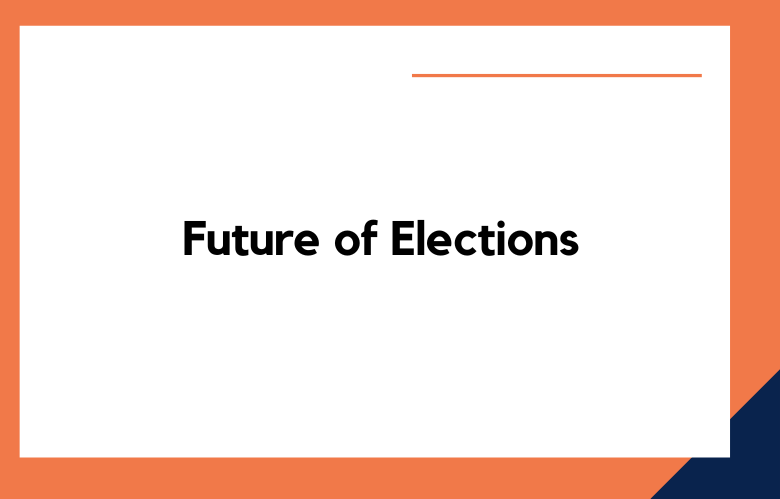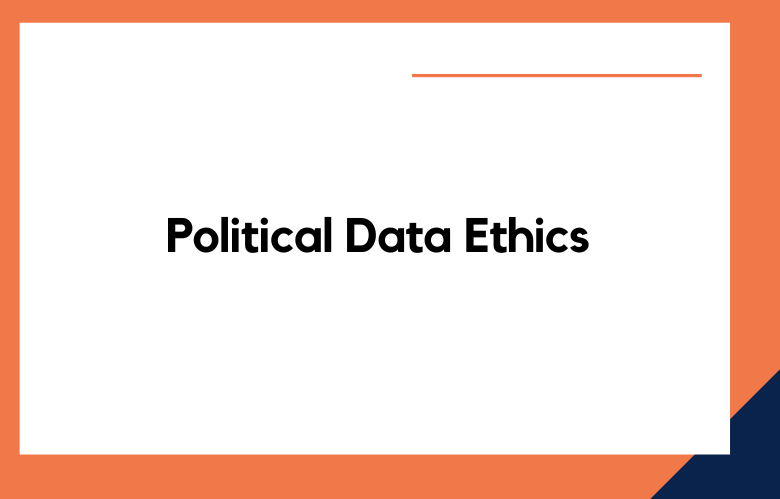The landscape of electoral politics is undergoing a significant transformation with the advent of Artificial Intelligence (AI). AI technologies are beginning to change how elections are conducted, analyzed, and influenced. This shift is revolutionizing campaign strategies and altering the fabric of electoral engagement and democracy.
The Future of Elections: How AI Is Changing the Game
AI in Voter Targeting and Campaign Strategies
Campaigns are increasingly using AI to understand and target voters effectively. By analyzing large datasets, AI can identify voting patterns, political preferences, and key issues for different demographics. This enables political campaigns to tailor their messages, focus their outreach efforts, and allocate resources more strategically to maximize impact.
Social Media Analytics and Sentiment Analysis
AI-driven social media analytics and sentiment analysis tools are invaluable in gauging public opinion and sentiment. Political campaigns and analysts can monitor real-time public reactions to debates, policies, and messages, providing insights that can shape campaign tactics and communications strategies.
Predictive Modeling for Election Outcomes
AI’s predictive modeling capabilities are used to forecast election results more accurately. These models can process complex datasets to predict voting outcomes, including polling data, past election results, and demographic information. This helps political parties in decision-making and adjusting strategies in the run-up to elections.
Combating Election Fraud with AI
AI technologies are being deployed to combat election fraud. AI systems can monitor voting patterns for irregularities, safeguard electronic voting systems against hacking, and ensure the integrity of voter registration databases. This application of AI is critical in maintaining the trust and legitimacy of electoral processes.
AI-Generated Content and Deepfakes
A controversial aspect of AI in elections is creating AI-generated content, including deepfakes. These hyper-realistic fake videos or audio can be used to spread misinformation or manipulate public opinion. While AI can be used to detect and counter such content, it remains a significant challenge for maintaining fair and transparent elections.
Ethical Implications and Privacy Concerns
The use of AI in elections raises ethical questions and privacy concerns. The collection and analysis of voter data must be balanced with individuals’ privacy rights. The potential for AI to be used for voter manipulation or to amplify partisan divides calls for ethical guidelines and regulations.
The Role of AI in Enhancing Voter Engagement
AI can also play a positive role in enhancing voter engagement. AI-driven platforms can provide voters personalized information about candidates and issues, assist in voter registration, and even help navigate the voting process. This can lead to increased participation and a more informed electorate.
The Rise of AI in Elections: How Technology Is Reshaping Democracy
“The Rise of AI in Elections” is a timely and thought-provoking title highlighting AI’s role in shaping the future of democracy.
Elections are the cornerstone of democracy, but they are not without their challenges.
From gerrymandering to misinformation campaigns, there are many ways in which elections can be manipulated or undermined. But with the advent of AI, we may enter a new era of elections where technology can help to level the playing field and ensure fairer, more transparent, and more accurate outcomes.
For example, AI can detect voter fraud, analyze voter registration data, and monitor social media for signs of disinformation campaigns. It can also create more accurate voter models, enabling political campaigns to target their messages more effectively and reach out to voters who might otherwise be overlooked.
Elections 2.0: Harnessing AI for Fairer and More Efficient Voting
“Elections 2.0” is a clever title that uses AI to upgrade the election process, making it fairer, more efficient, and more democratic than ever.
In today’s digital age, elections are increasingly vulnerable to interference and manipulation. But by leveraging the power of AI, we can create a more secure and transparent election process that better serves the needs of voters and democracy itself.
For example, AI can create more accurate and up-to-date voter rolls, reducing the likelihood of voter fraud or disenfranchisement. AI can also automate the counting and reporting of votes, reducing the risk of human error and increasing the speed and accuracy of election results.
The AI Electoral Landscape: Navigating Opportunities and Challenges
Integrating Artificial Intelligence (AI) into the electoral process significantly shifts how campaigns are run, votes are cast, and public opinion is shaped. This AI electoral landscape presents opportunities and challenges that need careful navigation.
Opportunities in the AI Electoral Landscape
“Opportunities in the AI Electoral Landscape” is a forward-thinking title emphasizing AI’s vast potential to improve elections.
As AI continues to evolve, new opportunities arise for creating fairer, more transparent, and more engaging elections. These opportunities can be divided into several key areas:
Voter Engagement:
AI can help to create more personalized and engaging voter experiences, such as targeted ads, interactive campaign materials, and customized voting information portals.
Election Integrity:
AI can be used to improve the security and transparency of elections through tools like blockchain voting and biometric authentication.
Campaign Efficiency:
AI can help campaigns allocate resources more efficiently by identifying and targeting key voter demographics or optimizing ad spending.
Enhanced Voter Engagement and Outreach
AI technologies enable political campaigns to engage with voters more effectively. AI can identify voter preferences and concerns by allowing campaigns to tailor their messages and outreach strategies for maximum impact.
S arisetreamlined Campaign Management
AI assists in optimizing campaign operations, from predicting voter turnout to managing campaign resources efficiently. AI algorithms can analyze vast amounts of data to inform strategic decisions, making campaign management more efficient and targeted.
Improved Voting Systems
AI can contribute to more secure and efficient voting systems. Machine learning algorithms can help safeguard electronic voting systems against tampering and fraud, ensuring the integrity and reliability of the electoral process.
Challenges in the AI Electoral Landscape
Data Privacy and Security
AI in elections raises significant concerns about data privacy and security. The collection and analysis of voter data must be managed responsibly to protect individual privacy and prevent data breaches.
Risk of Misinformation and Manipulation
AI tools, such as deepfake technology, pose a risk of spreading misinformation and manipulating public opinion. Ensuring the integrity of information disseminated through AI-driven platforms is a significant challenge.
Ethical Use of AI in Campaigns
The ethical use of AI in political campaigns is a crucial consideration. There is a need for clear guidelines and regulations to ensure that AI is used in a way that respects democratic values and promotes fair electoral practices.
Navigating the AI Electoral Landscape
To effectively navigate the AI electoral landscape, several measures should be considered:
Regulatory Frameworks
Developing robust regulatory frameworks is essential to govern the use of AI in elections. These should address issues such as data privacy, security, and the ethical use of AI.
Public Awareness and Transparency
Raising public awareness about the role of AI in elections and maintaining transparency in AI-driven electoral processes is vital. Voters should be informed about how their data is used, the measures in place to protect their privacy, and the integrity of the electoral process.
Combating AI-Driven Threats
Investing in technologies and strategies to combat AI-driven threats, such as deepfakes and cyberattacks, is crucial. This includes developing AI detection tools and strengthening cybersecurity defenses.
Collaborative Efforts
Collaboration between governments, technology experts, and civil society is needed to address the challenges posed by AI in elections. Joint efforts can lead to the development of more effective solutions and best practices.
Democracy Redefined: The Impact of AI on Elections
“Democracy Redefined” is an apt title highlighting how AI is transforming the very definition of democracy itself.
As we move toward a more digital and interconnected world, how we participate in democracy and elect our leaders is changing rapidly. AI plays a vital role in this transformation, from automating tedious tasks like counting votes to analyzing voter data and identifying potential fraud.
But beyond just making elections more efficient, AI has the potential to redefine the very meaning of democracy. For example, AI could create more participatory forms of democracy where citizens can directly engage with policy-making and government decision-making through digital platforms.
AI-Powered Elections: Unlocking a New Era of Voter Engagement
“AI-Powered Elections” is an exciting title that captures the potential of AI to revolutionize the way we engage with elections and democracy.
Traditionally, geography, socioeconomic status, or even simple inertia have often limited voter engagement. But by using AI to create more personalized and accessible experiences for voters, we can potentially unlock a new era of voter engagement.
For example, AI could create personalized voting information portals where voters can get tailored information about candidates, issues, and voting procedures based on their specific needs and interests. This could help to overcome barriers like language or lack of access to information, making the election process more inclusive and engaging for voters.
Game Changer: How AI Is Revolutionizing Electoral Campaigns
“Game Changer” is a fitting title that emphasizes the disruptive and transformative impact that AI is having on electoral campaigns.
In the past, electoral campaigns relied heavily on traditional forms of outreach, such as door-to-door canvassing, television and radio ads, and yard signs. But with the rise of AI, campaigns are increasingly turning to digital tools and technologies to reach and engage voters.
For example, AI can create highly targeted social media ads customized to individual voters’ interests and preferences. This allows campaigns to reach voters more efficiently and effectively while optimizing their spending on ads.
In addition, AI can help campaigns identify and mobilize volunteers, donors, and voters through data analysis and predictive modeling. This allows campaigns to allocate resources, such as campaign staff or advertising dollars, more effectively to reach the voters most likely to support them.
The Future is Here: AI’s Role in Securing Transparent Elections
“The Future is Here” is an apt title highlighting how AI is already shaping the future of elections by improving transparency and security.
Securing transparent elections has long been a series around the world. But with AI, we now see new possibilities for creating more secure and transparent election processes.
For example, AI can create more secure voting systems, such as online voting platforms that use biometric authentication or blockchain-based voting systems that provide a tamper-proof record of votes. It can help to ensure that every vote is accurately counted and that results are not manipulated.
Conclusion:
The future of elections in the AI era is a blend of opportunities and challenges. While AI offers tools for more effective campaign strategies, enhanced voter engagement, and more robust election security, it also brings risks related to misinformation, privacy, and ethical use. Balancing these will be crucial for leveraging AI to strengthen democratic processes and ensure fair, transparent, and inclusive elections.
Call: +91 9848321284
Email: [email protected]











